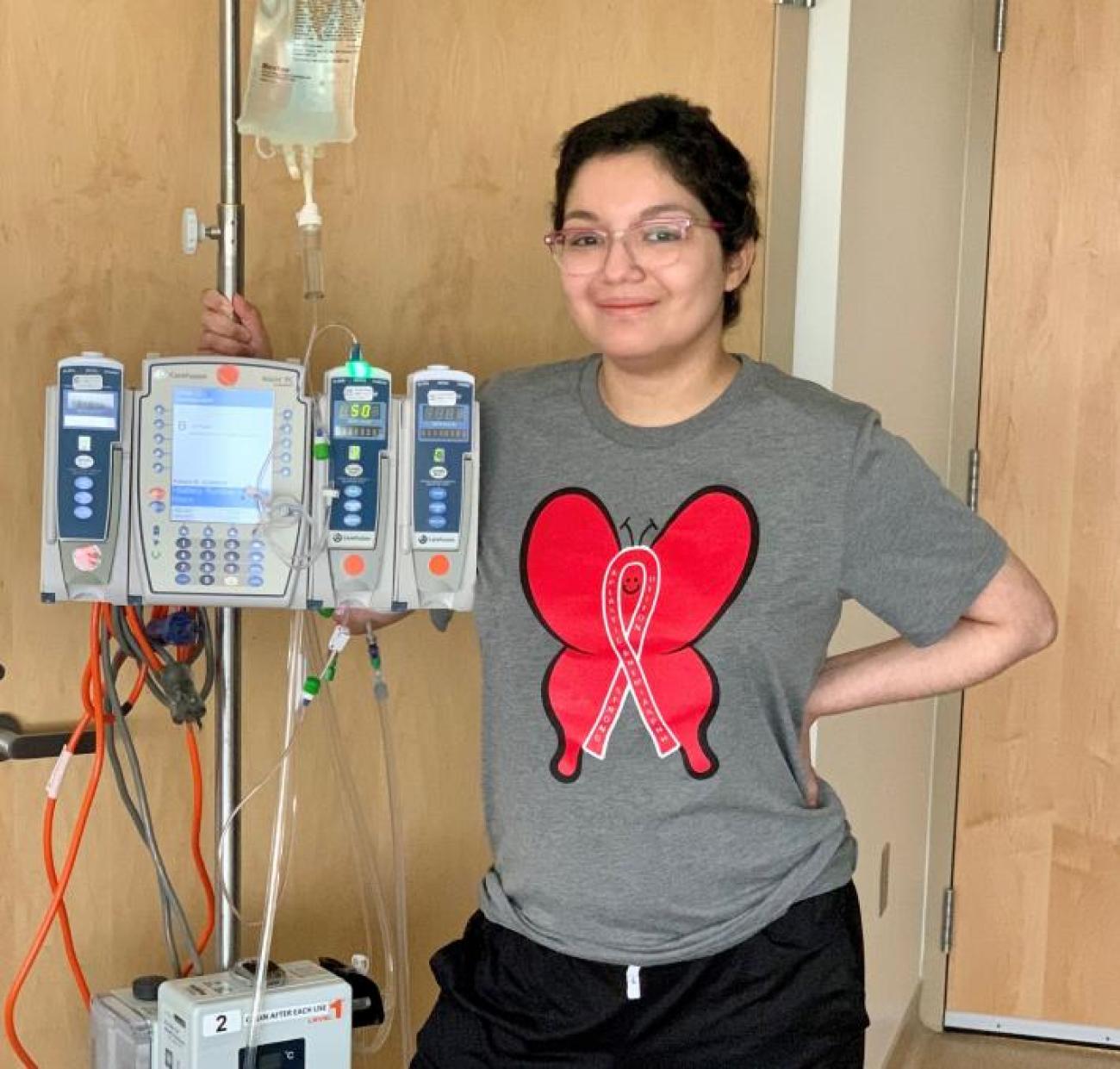
As a typical community college student, Mariana was busy. Classes, studying, day trips, all were part of her life. Yet during one shower, she dropped to the floor, suddenly dizzy. A few weeks later she would be out of breath, with unusual bruises on her skin.
At the end of the semester, she fainted in the grocery store while on vacation. Her parents dropped everything to drive the miles in a hurry, returning to an appointment with her family physician. Not yet diagnosed, she went to the first class of the new semester as usual, going to lunch and shopping with friends. The nap afterward was interrupted by a call from her doctor, who instructed her to go to the hospital immediately.
From the Emergency Department, Marianna was admitted to the ICU for her first of 5 blood transfusions blood transfusions: A blood transfusion is a safe and common procedure. Most people who have a bone marrow failure disease like aplastic anemia, MDS or PNH will receive at least one blood transfusion. When you receive a blood transfusion, parts of blood from a donor are put into your bloodstream. This can help some… . Before she was released, she had a bone marrow biopsy bone marrow biopsy: A medical procedure to remove a small piece of solid bone marrow using a needle that goes into the marrow of the hip bone. The solid bone marrow is examined for cell abnormalities, the number of different cells and checked for scarring of the bone marrow. , returning home to wait for the results. She had her birthday while waiting. On February 5 she saw the doctor, who was very kind as she explained both Severe Aplastic Anemia Aplastic Anemia: (ay-PLASS-tik uh-NEE_mee-uh) A rare and serious condition in which the bone marrow fails to make enough blood cells - red blood cells, white blood cells, and platelets. The term aplastic is a Greek word meaning not to form. Anemia is a condition that happens when red blood cell count is low. Most… and Paroxysmal Nocturnal Hemoglobinuria Paroxysmal Nocturnal Hemoglobinuria: (par-uk-SIZ-muhl nok-TURN-uhl hee-muh-gloe-buh-NYOOR-ee-uh) A rare and serious blood disease that causes red blood cells to break apart. Paroxysmal means sudden and irregular. Nocturnal means at night. Hemoglobinuria means hemoglobin in the urine. Hemoglobin is the red part of red blood cells. A… .
In the upcoming weeks, she would have many blood transfusions, B12 injections, and blood draws while they searched for a transplant match. Even though she had multiple 10/10 matches, her wait grew longer as the COVID-19 pandemic hit, filling hospitals and delaying her treatment. She was too exhausted to do much more than stay in bed as she waited.
Finally, in May, she was selected as one of the first to be admitted to the freshly reopened unit. Day 1 of her transplant preparation was surgery for a trifusion catheter and receiving fluids. Day 2 included chemotherapy chemotherapy: (kee-moe-THER-uh-pee) The use of medicines that kill cells (cytotoxic agents). People with high-risk or intermediate-2 risk myelodysplastic syndrome (MDS) may be given chemotherapy to kill bone marrow cells that have an abnormal size, shape, or look. Chemotherapy hurts healthy cells along with… , and Day 3 focused on methotrexate. Marianna was so happy that her mom, a nurse, was allowed stay with her during this time, living with her on the unit. Her mom kept her spirits up as she spent the next days with nausea and fatigue.
Finally, the day of her transplant came: May 28. She enjoyed her favorite cupcakes, and the room was filled with decorations. A priest blessed the bag of life-giving cells by phone she received them. After the transplant, she only experienced mild GVHD (Graft vs. Host Disease) symptoms with some allergies, skin issues, and taste buds. She was fatigued as well, and had some fevers, but when she had a few days without fever, she went home, after only three weeks!
During the summer, Marianna had a few short hospitalizations. One was for treatment for Post-Transplant Lymphoproliferative disorders and mild lymphoma. At 100 days, she showed 99% engraftment engraftment: Refers to how well a graft (donor cells) is accepted by the host (the patient) after a bone marrow or stem cell transplant. Several factors contribute to better engraftment - physical condition of the patient, how severe the disease is, type of donor available, age of patient. Successful… . No trace remained of aplastic anemia or PNH!
Although it seemed like a slow recovery to Marianna, she now “feels like herself!” She says she can almost forget this ever happened. What advice does Marianna share with others? First, she says, “Don’t be afraid to ask for help from everyone!” She says it might be difficult or embarrassing, but all the help you receive will lead to recovery.
She also reminds other patients not to feel guilty about things like food or exercise. Sometimes, she says, you need to do what you can to feel better, so be kind to yourself. And “Give yourself time,” is her last word for patients. Your recovery will come in the time that you need. Finally, Marianna shares this bit of wisdom, “If you feel like something is not OK, then have it checked out!” ---- Stay tuned here for updates on Marianna’s evolving story!

